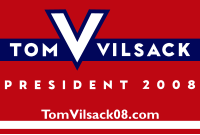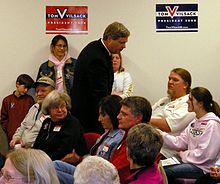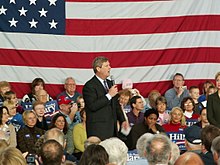
Thomas James Vilsack is an American politician. He served as the 32nd United States secretary of agriculture during the Biden administration. He previously served in the role from 2009 to 2017 during the Obama administration. A member of the Democratic Party, he served as the 40th governor of Iowa from 1999 to 2007.

Presidential elections were held in the United States on November 4, 2008. The Democratic ticket of Barack Obama, the junior senator from Illinois, and Joe Biden, the senior senator from Delaware, defeated the Republican ticket of John McCain, the senior senator from Arizona, and Sarah Palin, the governor of Alaska. Obama became the first African American to be elected to the presidency. This was the first election since 1952 in which neither the incumbent president nor vice president was on the ballot, as well as the first election since 1928 in which neither ran for the nomination.

The 2006 United States Senate election in New York was held on November 7, 2006. Incumbent Democratic U.S. Senator Hillary Clinton won re-election to a second term in office, by a more than two-to-one margin. Clinton was challenged by Republican John Spencer, the former mayor of Yonkers. Longtime political activist Howie Hawkins of the Green Party also ran a third-party campaign.

In the United States 2008 Democratic Party presidential primaries, the total number of delegates was 4050. Delegates required for nomination were 2118.

From January 3 to June 3, 2008, voters of the Democratic Party chose their nominee for president in the 2008 United States presidential election. Senator Barack Obama of Illinois was selected as the nominee, becoming the first African American to secure the presidential nomination of any major political party in the United States. Due to a close race between Obama and Senator Hillary Clinton of New York, the contest remained competitive for longer than expected; neither candidate received enough pledged delegates from state primaries and caucuses to achieve a majority, without endorsements from unpledged delegates (superdelegates).
The following is a timeline of major events leading up to and immediately following the United States presidential election of 2008. The election was the 56th quadrennial United States presidential election. It was held on November 4, 2008, but its significant events and background date back to about 2002. The Democratic Party nominee, Senator Barack Obama of Illinois, defeated the Republican Party's nominee, Senator John McCain of Arizona.

On February 10, 2007, Barack Obama, the junior United States senator from Illinois, announced his candidacy for the presidency of the United States in Springfield, Illinois. Obama announced his candidacy at the Old State Capitol building, where Abraham Lincoln had delivered his "House Divided" speech. Obama was the main challenger, along with John Edwards, to front-runner Hillary Clinton for much of 2007. He had only recently emerged as a national figure in Democratic politics, having delivered the DNC keynote address just three years prior and won his Senate election shortly thereafter.
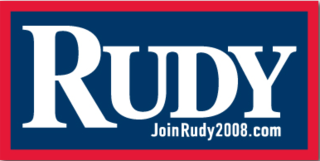
The 2008 presidential campaign of Rudy Giuliani began following the formation of the Draft Giuliani movement in October 2005. The next year, Giuliani opened an exploratory committee and formally announced in February 2007 that he was actively seeking the presidential nomination of the Republican Party.
The 2008 presidential campaign of Mike Gravel, former Speaker of the Alaska House of Representatives and United States Senator from Alaska, began on April 17, 2006, when he declared his candidacy for the Democratic nomination for President of the United States in the 2008 election, in a speech to the National Press Club.

The 2008 presidential campaign of John McCain, the longtime senior U.S. Senator from Arizona, was launched with an informal announcement on February 28, 2007, during a live taping of the Late Show with David Letterman, and formally launched at an event on April 25, 2007. His second candidacy for the Presidency of the United States, he had previously run for his party's nomination in the 2000 primaries and was considered as a potential running mate for his party's nominee, then-Governor George W. Bush of Texas. After winning a majority of delegates in the Republican primaries of 2008, on August 29, leading up to the convention, McCain selected Governor Sarah Palin of Alaska as his running mate for Vice President. Five days later, at the 2008 Republican National Convention, McCain was formally selected as the Republican Party presidential nominee in the 2008 presidential election.
The 2008 presidential campaign of John Edwards, former United States Senator from North Carolina and Democratic nominee for Vice President in 2004 began on December 28, 2006, when he announced his entry into the 2008 presidential election in the city of New Orleans near sites devastated by Hurricane Katrina. On January 30, 2008, Edwards returned to New Orleans to announce that he was suspending his campaign for the Presidency. On May 14, 2008, he endorsed Barack Obama at a campaign event in Grand Rapids, Michigan.
Joe Biden, a longtime U.S. senator from Delaware, began his 2008 presidential campaign when he announced his candidacy for President of the United States on the January 7, 2007, edition of Meet the Press. He officially became a candidate on January 31, 2007, after filing papers with the Federal Election Commission.

The Mike Huckabee 2008 presidential campaign began on January 28, 2007, when former Governor of Arkansas Mike Huckabee announced his candidacy for the Republican nomination for President of the United States for the 2008 election. Huckabee ultimately ended his bid for the nomination after losing the Texas Republican primary on March 4, 2008.

The 2008 presidential campaign of Dennis Kucinich, House Representative of Ohio and former mayor of Cleveland, began on December 12, 2006, when he announced that he would seek the nomination for the Democratic Party to run for President of the United States. Although a Democratic candidate, he was not included in the New Hampshire debates on January 4, 2008, or the South Carolina debates on January 21, 2008, because of his poor showings in the Iowa caucuses and the polls.
The 2008 presidential campaign of Tom Tancredo, a Congressman from Colorado began on April 2, 2007 with a formal announcement. The campaign garnered grassroots support and endorsements from conservative Republicans concerned about illegal immigration and border security. However, Tancredo remained low in the polls and was criticized for his nativist campaign, which had been described as "single-issued." Tancredo stated that he probably would not win the nomination but hoped his campaign would bring forth more debate on his issue of concern, immigration. On December 20, 2007 Tancredo withdrew from the presidential race, and endorsed Mitt Romney.

The 2008 presidential campaign of Chris Dodd was launched on January 11, 2007, and ended on January 3, 2008, after a sixth-place finish in the Iowa caucuses. Dodd, the senior senator from Connecticut, sought the nomination of the Democratic Party for president of the United States. Centering his campaign in the states of Iowa and New Hampshire, he centred his campaign on the theme of change. Dodd's performance in the opinion polls varied, but in the financial sphere, he had secured some notable and influential endorsements who were the ones largely funding his campaign.
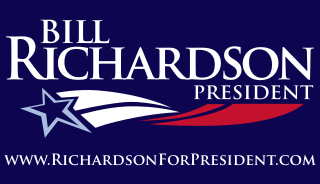
The 2008 presidential campaign of Bill Richardson, New Mexico Governor Bill Richardson announced his candidacy on January 21, 2007, for President of the United States on ABC's This Week with George Stephanopoulos, by virtue of forming a presidential exploratory committee.

The 2008 United States presidential election in Iowa took place on November 4, 2008, as part of the 2008 United States presidential election. Voters chose seven representatives, or electors to the Electoral College, who voted for president and vice president.
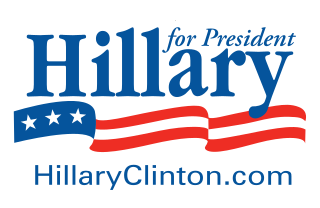
U.S. Senator Hillary Clinton of New York unsuccessfully sought the Democratic Party's 2008 nomination for president of the United States. She won many primaries, although she ultimately lost the nomination to Barack Obama.

The 2008 presidential campaign of Evan Bayh, Democratic Senator and 46th Governor of Indiana, began shortly after the 2004 presidential election.
